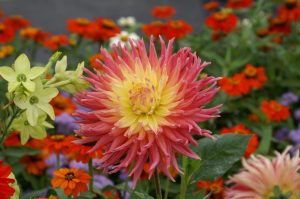Some years it seems we have more than the usual amount of rain in the summer. Some years we can’t seem to get enough. Excess rain may give us greener lawns, however it is important to remember that the rain also ends up in the storm drainage system. Any fertilizers or pesticides people use for lawn care can wind up in the same storm drains, which eventually drain into our local waters. Excess nutrients from fertilizers and chemicals from pesticides can cause drinking water contamination, massive algae blooms, and affect the fish population.
Here are a few tips that may help to minimize the effect that fertilizers and pesticides have on our water resources:
- Fertilize sparingly – September is the best month to fertilize. Use a slow time-release fertilizer that is water insoluble, or has slowly -available soluble nitrogen.
- Follow the directions carefully, making sure to apply no more than one to two pounds of nitrogen per 1000 square feet of lawn.
- If using a lawn care company, ask about their environmental options.
- Mow the grass high and leave grass clippings on the lawn to help improve the quality of the lawn.
- Avoid using fertilizers or pesticides near wells or within 75 ft. of a waterway.
- Avoid applying fertilizers or pesticides when rain is predicted to help prevent the runoff into the storm drains.
- Try to hand pick weeds when possible, or spot treat. It is not always necessary to spray the entire lawn.
- Sweep the sidewalk and driveway if any lawn chemicals or yard debris gets on them. Anything on the pavement is more easily washed by storm water into the storm drains.
- For Green Gardening, less is better and will also save you money!
Written by Laura Iorio, REALTOR for Calcagni Associates.




